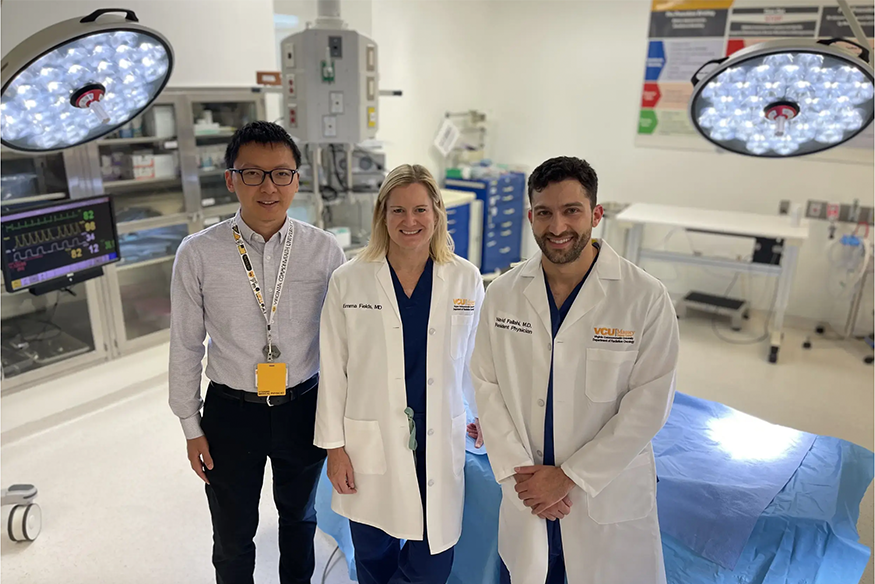Latest News
Research, Clinical, Technology
VCU team has designs on a game-changer in women’s cancer treatment
Aug 29, 2024
 Members of the VCU team developing the novel brachytherapy tandem applicator include, from left: Tianjun Ma, Ph.D., Emma Fields, M.D., and Navid Fallahi, M.D. (Dan Carrigan/Kelley)
Members of the VCU team developing the novel brachytherapy tandem applicator include, from left: Tianjun Ma, Ph.D., Emma Fields, M.D., and Navid Fallahi, M.D. (Dan Carrigan/Kelley)
Navid Fallahi knew there had to be a better way.
Fallahi, M.D., is a fourth-year clinical resident at Virginia Commonwealth University’s School of Medicine and Massey Comprehensive Cancer Center. Cervical and uterine cancers present significant challenges in his specialty – radiation oncology – and as he was preparing to treat a patient at VCU Medical Center, he wondered: Could a radiation device be created to accommodate the unique anatomy of each woman?
That spark of an idea quickly grew. Within just months – thanks to supportive faculty at Massey, VCU School of Medicine and TechTransfer and Ventures – Fallahi and a cross-functional VCU team are nearing a testable prototype that offers promise for improving the treatment of gynecological cancers.
To fight those cancers, doctors turn to brachytherapy, an internal treatment in which a radioactive source is placed inside or next to the cancerous area. This allows delivery of higher doses of radiation directly to that area, as opposed to using external beam radiation therapy.
While brachytherapy is particularly effective for treating cervical and uterine cancers, existing devices have significant limitations. Their rigid designs do not account for anatomical variations in women, which can lead to suboptimal radiation delivery and increased exposure for healthy tissues.
“As we were doing cases, we were seeing in real time how there were so many women for whom the traditional devices just didn’t fit their anatomy as well as we would like,” Fallahi said. “The need for customizable devices became very obvious to us. It’s time to make some differences in these kinds of areas.”
“We just realized this isn’t working for all of our ladies,” said Emma Fields, M.D., who is advising on the project and is professor and radiation oncology residency program director at the School of Medicine and Massey. “We have some ladies where their uterus is much longer or much more curved or pointing completely backward, retroverted. And we ended up sort of customizing one of our own applicators.”
So the VCU team has developed a steerable tandem applicator, whose flexible, jointed design can be adjusted to each patient’s anatomy. The innovative tip can be set at various angles – and adjusted during the procedure – to ensure precise placement, which helps focus radiation on the tumor with minimal impact on surrounding tissues. The applicator would be MRI-compatible, so that advanced imaging techniques can further guide the device accurately.
The team was among six recipients of the spring 2024 round of Commercialization Fund awards from Tech Transfer and Ventures, part of the Office of the Vice President for Research and Innovation. The awards support inventors who are conducting valuable translational research with a clear pathway to market.
“The funds meant everything to us,” Fallahi said. “Without them, we wouldn’t have been able to even begin prototyping. This funding has truly launched everything.”
He noted a number of potential markets for the steerable tandem applicator. Among them: universities and clinics that perform brachytherapy, as well as several large radiation oncology companies that could license the device or incorporate its technology into their own products.
Fallahi is grateful for the partnership with TechTransfer and Ventures, which provides comprehensive support, including funding, resources and strategic guidance, to help turn innovative ideas into market-ready products.
“Not only was I surprised at how well-equipped VCU was to jump into something like this and be able to make something like this a reality, but also how efficient VCU was,” he said.
Brittaney Ritchie, business development and medical devices licensing manager at TechTransfer and Ventures, is working closely with Fallahi and others on the steerable tandem applicator.
“It’s fantastic to support a project with such strong market potential that meets a need to better tailor treatment,” she said. “This is a huge step in a positive direction for women’s health to move away from a one-size-fits-all environment.”
Collaborations with manufacturing companies are underway to finalize the design and produce a testable prototype, and rigorous testing would begin to ensure its safety and efficacy. The process would include evaluations to assess its performance, stability and radiation delivery accuracy. Feedback from the tests would be used to refine the prototype before moving on to clinical trials.
The ultimate goal is to obtain Food and Drug Administration clearance, allowing for commercialization and widespread use.
“We’re working on advancing the space of customizable health care treatment delivery and advancing women’s care,” Fallahi said. “The end product will be so exciting.”
This article was originally published by VCU News.
Written by: Dan Carrigan
Related News
Research
Robert A. Winn Clinical Investigator Pathway Program welcomes fourth cohort of medical student awardeesJul 8, 2025
Research
“We’re aiming for a cure.” Massey and VIMM researchers achieve potential breakthrough in brain cancer treatmentJun 24, 2025

Get access to new, innovative care
Treatments in clinical trials may be more effective or have fewer side effects than the treatments that are currently available. With more than 200 studies for multiple types of cancers and cancer prevention, Massey supports a wide array of clinical trials.

Find a provider
Massey supports hundreds of top cancer specialists serving the needs of our patients. Massey’s medical team provides a wealth of expertise in cancer diagnosis, treatment, prevention and symptom management.
